What Medicine Is Best for Dog Allergies
 Whether your dog is suffering from digestive issues or skin problems, allergies can wreak havoc on a dog's body. How can you relieve your dog's suffering? You're likely wondering, what can I give my dog for allergies? Our experts tell you all of the safe medications, supplements, and other products that can help your pup.
Whether your dog is suffering from digestive issues or skin problems, allergies can wreak havoc on a dog's body. How can you relieve your dog's suffering? You're likely wondering, what can I give my dog for allergies? Our experts tell you all of the safe medications, supplements, and other products that can help your pup.
Prescription Medications
Some of the best allergy meds for dogs are available only by prescription from your veterinarian. These allergy meds are immunosuppressants, which work directly on your dog's immune system to suppress an allergic reaction.
Nonsteriodal Immunosuppressants
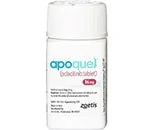 Nonsteroidal immunosuppressants relieve allergies without the negative side effects of steroids. The dog allergy medicine Apoquel (oclacitinib) is highly effective against airborne allergens and food and flea allergies. It begins to relieve itching and inflammation within four hours, and its effects can last up to 24 hours. Learn more about Apoquel for dogs.
Nonsteroidal immunosuppressants relieve allergies without the negative side effects of steroids. The dog allergy medicine Apoquel (oclacitinib) is highly effective against airborne allergens and food and flea allergies. It begins to relieve itching and inflammation within four hours, and its effects can last up to 24 hours. Learn more about Apoquel for dogs.
Atopica (cyclosporine) is another nonsteriodal immunosuppressant, which is most commonly prescribed for airborne allergies. Both Apoquel and Atopica are suitable for both short and long-term treatment.
Corticosteroids
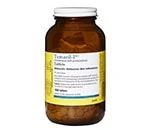 Steroids help control allergy symptoms by reducing inflammation. But because they have significant negative side effects, they're best for short-term treatment. The most common oral steroids prescribed for dog allergies are prednisone and Temaril-P (trimeprazine with prednisolone).
Steroids help control allergy symptoms by reducing inflammation. But because they have significant negative side effects, they're best for short-term treatment. The most common oral steroids prescribed for dog allergies are prednisone and Temaril-P (trimeprazine with prednisolone).
Some veterinarians use longer-acting steroid injections such as Vetalog, but side effects can be harsher with injections rather than steroid pills. Long-term side effects from steroids can include increased urinary tract infections (UTIs), susceptibility to bacterial and fungal infections, obesity, muscle weakness, and more.
What's The Best Antihistamine For Dogs?
 Several over-the-counter (OTC) human antihistamines can work to help relieve dog allergy symptoms, but we recommend that you consult with your veterinarian before administering any of these medications.
Several over-the-counter (OTC) human antihistamines can work to help relieve dog allergy symptoms, but we recommend that you consult with your veterinarian before administering any of these medications.
Benadryl (diphenhydramine) is the most popular antihistamine for humans and can be effective for dogs as well. Just be aware that Benadryl has sedative properties, so your dog could get very drowsy. Other safe antihistamines for dogs include Claritin (loratadine) and Zyrtec (cetirizine). They produce less sedation than Benadryl does but could still make your dog drowsy.
Warning: Make sure your OTC allergy medicine only contains antihistamine. Some may contain other ingredients, such as decongestants, which aren't safe for dogs.
Dosing For Dogs
- Benadryl: 1 milligram/pound of body weight, given twice daily
- Claritin: approximately 0.1 to 0.5 milligram/pound of body weight, given once to twice daily
- Zyrtec: approximately 0.5 mg/pound of body weight, given once to twice daily
Other Over-The-Counter Allergy Relief For Dogs
If you're wary of giving your dog pharmaceutical drugs, you're in luck. There are a lot of safe and effective products on the market these days that can help ease your dog's allergy symptoms. They come in several forms, from dietary supplements and food toppers to shampoo and topical sprays and balms.
Talk to your veterinarian before using these products, especially the medicated shampoos, to help relieve your dog's allergies. You'll want to be sure that the products will not interfere with any other medication that your dog may be taking.
Dietary Supplements
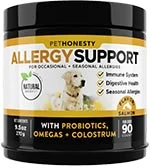 Pet Honesty has several excellent, all-natural daily supplements for dog allergies, including Allergy Control soft chews, Allergy SkinHealth food topper, and Anti-Scratch Salmon Oil. Another highly-rated option is Zesty Paws Aller-Immunity Bites. These grain-free soft chews contain immune-boosting ingredients, a five-strain probiotic, apple cider vinegar, salmon oil, and colostrum.
Pet Honesty has several excellent, all-natural daily supplements for dog allergies, including Allergy Control soft chews, Allergy SkinHealth food topper, and Anti-Scratch Salmon Oil. Another highly-rated option is Zesty Paws Aller-Immunity Bites. These grain-free soft chews contain immune-boosting ingredients, a five-strain probiotic, apple cider vinegar, salmon oil, and colostrum.
See Our Full Review Of PetHonesty
Probiotics
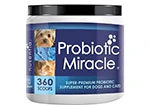 Giving your dog a daily probiotic can help ease such allergy symptoms as digestive problems and itching and scratching. We recommend Nusentia Probiotic Miracle, which contains six different probiotic strains and a prebiotic to combat diarrhea, loose stool, yeast overgrowth, bad breath, constipation, itching & scratching, allergies, and digestive issues.
Giving your dog a daily probiotic can help ease such allergy symptoms as digestive problems and itching and scratching. We recommend Nusentia Probiotic Miracle, which contains six different probiotic strains and a prebiotic to combat diarrhea, loose stool, yeast overgrowth, bad breath, constipation, itching & scratching, allergies, and digestive issues.
See Our Reviews Of The Best Probiotics For Dogs
Topicals

If you prefer a balm rather than spray, the Natural Dog Company has an excellent all-natural Skin Soother balm that helps treat itchy and inflamed skin, rashes, hot spots, bacterial skin infections, cuts, burns, surgical wounds, mange, and more. This organic and vegan balm contains soothing and healing ingredients like lavender, chamomile, frankincense, cocoa butter, and vitamin E.
Shampoo
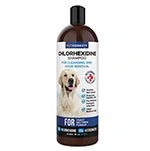 PetHonesty has a fantastic Allergy Itch Relief Shampoo that contains chlorhexidine and ketoconazole to ease skin itching and improve skin inflammation, rashes, hot spots, skin infections, and wounds. Another effective option is Vet's Best Allergy Itch Relief Dog Shampoo, a veterinarian-formulated blend of essential oils and key natural ingredients (oatmeal, D-limonene, and tea tree oil) to calm down and moisturize itchy red skin.
PetHonesty has a fantastic Allergy Itch Relief Shampoo that contains chlorhexidine and ketoconazole to ease skin itching and improve skin inflammation, rashes, hot spots, skin infections, and wounds. Another effective option is Vet's Best Allergy Itch Relief Dog Shampoo, a veterinarian-formulated blend of essential oils and key natural ingredients (oatmeal, D-limonene, and tea tree oil) to calm down and moisturize itchy red skin.
How Do I Know What's Causing My Dog's Allergies?
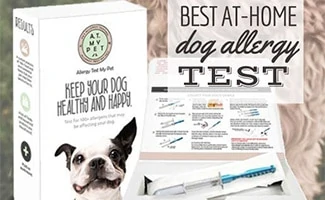 Consulting with your vet is the best way to determine what your dog is allergic to. But you can also do an at-home dog allergy test to discover if your dog has any insensitivities to many food ingredients and environmental allergens.
Consulting with your vet is the best way to determine what your dog is allergic to. But you can also do an at-home dog allergy test to discover if your dog has any insensitivities to many food ingredients and environmental allergens.
If you use an at-home allergy test, discuss the results with your vet so they can confirm the results and recommend the most appropriate allergy treatment for your dog.
Allergy Symptoms
The signs of dog allergies typically involve skin and digestive issues. Symptoms depend on the allergen that's causing the allergy and the severity of the reaction. But here are some signs to look out for:
- Excessive itching
- Constant licking
- Biting or gnawing at the skin
- Red, inflamed skin
- Hives or rashes
- Swelling of the face, ears, lips, eyelids, or earflap
- Diarrhea
- Vomiting
- Sneezing
- Itchy ears
- Chronic ear infections
- Itchy, runny eyes
Learn More About Dog Allergy Symptoms And Causes
Frequently Asked Questions About Dog Allergy Meds
Here are some of the common questions we get from our readers about dog allergy meds.
You should always check with your vet before administering any medication to ensure it's safe for your dog. Each dog is different, and dosage amounts vary based on the dog's size and needs.
Can I Give My Dog A Decongestant?
Experts warn against a decongestant for dogs. Like pseudoephedrine and phenylephrine, decongestants can be life-threatening for dogs and can cause vomiting, severe blood pressure changes, abnormal heart rates and rhythms, tremors, and seizures.
Seek veterinary care immediately if your dog accidentally ingests any kind of decongestant (they're commonly found in human cold and flu OTC medications, particularly ones with a "-D" at the end of the name.)
Can Dogs Take Claritin?
Yes, Claritin can be safe and effective for dogs. Vets recommend that you give your dog approximately 0.1 to 0.5 milligram/pound of body weight once to twice daily. However, check with your vet before administering any medication to ensure it's safe for your dog.
Can Dogs Take Zyrtec?
Yes, Zyrtec can be a safe and effective antihistamine for pups. Vets recommend approximately 0.5 mg per pound of body weight, given once to twice daily.
Zyrtec vs Claritin for dogs – wondering which is better? Like with humans, it depends on the individual. You can speak with your vet about trying both individually to see which seems to work better for your pup.
Can Dogs Get Allergy Shots?
Yes, vets can use allergy shots to help deal with symptoms and provide your dog relief. Cytopoint is the most common allergy shot.
Home Remedies For Dog Allergies
Check out this three-minute video to see some cheap and easy home remedies that may help ease your dog's allergy symptoms.
Pet Insurance Can Help Pay Vet Bills
Dogs can develop so many chronic problems over their lifetimes, as well as unforeseen accidents and illnesses. But if you get pet insurance early in your dog's life (before a condition is considered pre-existing), health issues that arise in the future (like chronic allergies) could be covered for vet visits and prescription medications. See our reviews of the best pet insurance companies to learn more.
What medication or supplement has helped your dog's allergies?
About The Author: Sally Jones
Sally has been a writer and copy editor for Canine Journal for many years. She has 25+ years of professional writing and editing experience. She also has years of experience in public relations, marketing, and fundraising communications, specializing in health care communications. Her past work history and major freelance clients include the UVA Health System, the VCU Health System, the MCV Foundation, and various local and regional publications.
Sally holds a BA in English from James Madison University and began her writing career as a graduate student at the UNC-Chapel Hill School of Journalism & Mass Communications. She's been researching and writing about dogs for Canine Journal since 2015, specializing in dog health articles. But she also has written extensively about dog accessories, pet insurance, training, and many other dog subjects. Her work has appeared in several notable media outlets, including The Washington Post, Entrepreneur, People, Forbes, Huffington Post, and more.
Sally has never lived in a home without pets. Now, she and her two daughters, who live in the foothills of the Blue Ridge Mountains in Virginia, are proud pet parents of all rescued pets (one dog and four cats). If they had room, there would be many more! They can't imagine life without a home full of their fun and loving furry companions.
Disclaimer: This website contains reviews, opinions and information regarding products and services manufactured or provided by third parties. We are not responsible in any way for such products and services, and nothing contained here should be construed as a guarantee of the functionality, utility, safety or reliability of any product or services reviewed or discussed. Please follow the directions provided by the manufacturer or service provider when using any product or service reviewed or discussed on this website.
We are a participant in the Amazon Services LLC Associates Program, an affiliate advertising program designed to provide a means for us to earn fees by linking to Amazon.com and affiliated sites.
Disclaimer: The information provided through this website should not be used for diagnosing or treating a health problem or a disease. It is not a substitute for professional care. If you have or suspect you may have a health problem, you should consult your health care provider.
What Medicine Is Best for Dog Allergies
Source: https://www.caninejournal.com/best-allergy-medicine-for-dogs/
0 Response to "What Medicine Is Best for Dog Allergies"
Post a Comment